In a SHTF scenario, your horse can be an invaluable survival tool.
He can carry you to safety, haul your provisions, drag logs or injured people, and perform any number of other useful tasks. Horses are naturally creatures of flight though so if you want to use him in a survival situation, you need to train him properly.
Fortunately, training him isn’t a hard job but it will take a bit of time and effort on your part. Throughout the following paragraphs we’re going to discuss how to train your horse for survival if SHTF.
It’ll be fun!
Trailer Training
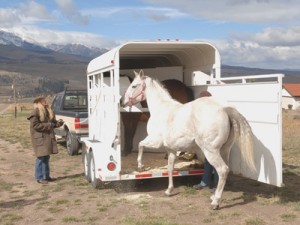
- Feed him in the trailer. Simply park the trailer in the field with all of the doors open and place his feed bucket in it. Start with it near the back so that he just needs to put his head in to eat, then move it back a bit farther each day until he’s climbing right it to eat.
- Gentle pressure on the lead rope. Using release from pressure is a great way to train a horse to do just about anything. Open the trailer up wide so that it’s as light as possible inside. Line the horse up so that he’s in position to walk in. Put gentle pressure on his lead rope and every time he gives even a little by moving forward, release the pressure, reward him, and apply pressure again. It’s a slow process that may take a few sessions but it works.
The key to teaching a horse to trailer is patience. If he doesn’t get in during the first session, stay calm, end the training session on a positive note, and try again the next day.
Desensitization Training
If you’re going to use your horse in a SHTF situation, he needs to be accustomed to anything that may crop up in the environment. You can’t prepare him for everything but you desensitize him to common things that you may encounter on the trail so that he doesn’t spook and hurt you or himself. The best way to do this is just to expose him to them in his daily environment. Some of these things include:
- Flapping objects. Horses are shy about objects that flap around and make noise and in a SHTF scenario, you’re likely to encounter this. Tarps, flags, sheets on clothes lines and rain coats are just a few common flapping objects that will spook a horse.
- Water. Horses often won’t willingly cross water because they have poor depth perception so do what you can to get your horse used to stepping in large puddles or crossing streams.
- Loud noises. Horses tend to be spooky about sudden, loud noises so getting him used to sounds such as banging doors, gun shots and whip cracks is a good idea.
- Fire. Fire is a horse’s natural enemy and they will spook from even a small campfire if they aren’t used to being around it.
- Dragging objects. Having anything dragging behind him is sure to scare your horse if he isn’t used to it. However, in a SHTF situation, you may need him to do this for several reasons. Start small and move to larger things. Be extremely careful with this though: you don’t want either of you to get hurt and frightening him will make the training process slower.
- Ponying another horse. Some horses are fine with having a rider lead another horse and some aren’t. Since you may want to lead a pack horse, it’s a good idea to get your horse used to doing this on a regular basis.
- Standing still while mounting and mounting from either side. This may sound like a no-brainer but you’d be surprised how many horses won’t stand still to be mounted or become uncomfortable if you try to mount them from the off side. In case of injury or danger, you need to teach your horse to stand still while being mounted from either side.
- Carrying 2 riders. Just as carrying one rider isn’t natural to a horse, neither is carrying 2 riders. Teach your horse to double up so that you can ride double in a SHTF scenario if you need to.
- Carrying a pack. Anything bouncing around behind the saddle will feel weird to your horse but most don’t mind carrying a pack. Still you don’t want him to freak out when you’re trying to bug out just because he’s scared of a pack. Get him used to it now.
- Standing tied. It may seem obvious but your horse needs to be able to stand tied. Teaching him to ground tie and tie on a line next to other horses is also a great idea.
Leg Command Training
An important thing to train your horse for in a SHTF scenario is to move and stop using leg commands. Your hands may be full but you still need to be in control and be mobile. At the very minimum, teach your horse to stop, back and go forward at a walk, trot and canter using just your legs. You can do this using extinguishing – issue the command that you usually use to get a response paired with the leg command and gradually fade out the hand commands so that you’re only using your legs.
Opening and Closing Gates

This is a great skill to train your horse for in a SHTF scenario. You will undoubtedly need to open and close gates and doors and if you can do it quickly without getting off of your horse, that’s even better. It’s an easy skill to learn that involves backing, side-passing, and pivoting. These are skills that a horse should have anyway, so opening and closing a gate will be easy to teach. Try doing it with just your legs just to be a little more prepared.
Training your horse for a SHTF scenario is a great thing to do. He can travel farther and faster than you can, he can carry your gear, pull logs for firewood or shelter, notify you when somebody is near, and just serve as a companion when things get cold and lonely. Start now and you’ll have an awesome tool and a friendly ear no matter what SHTF scenario you find yourself in!
This article has been written by Theresa Crouse for Survivopedia.


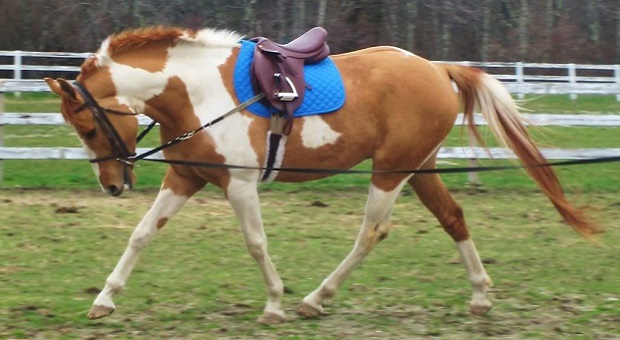
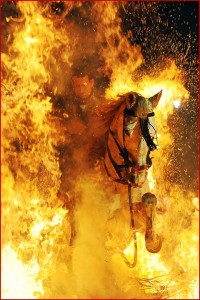
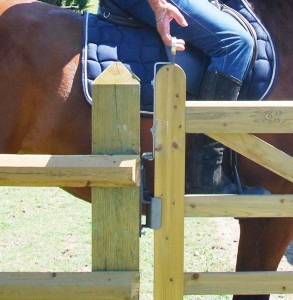

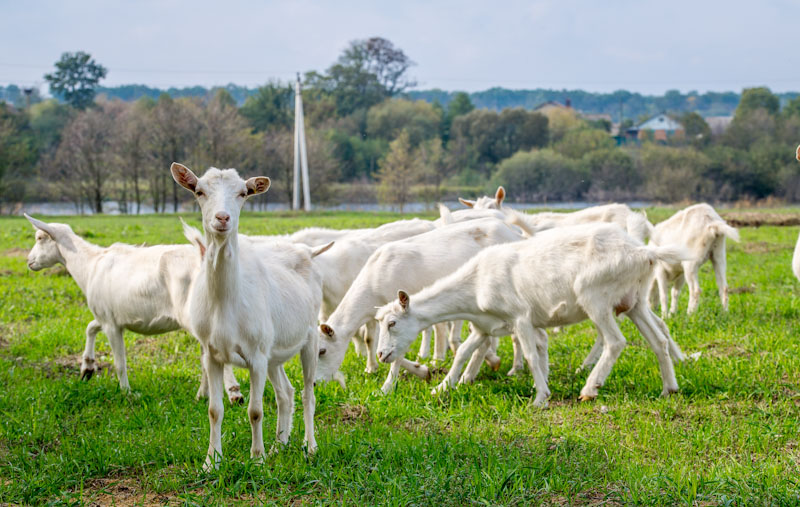
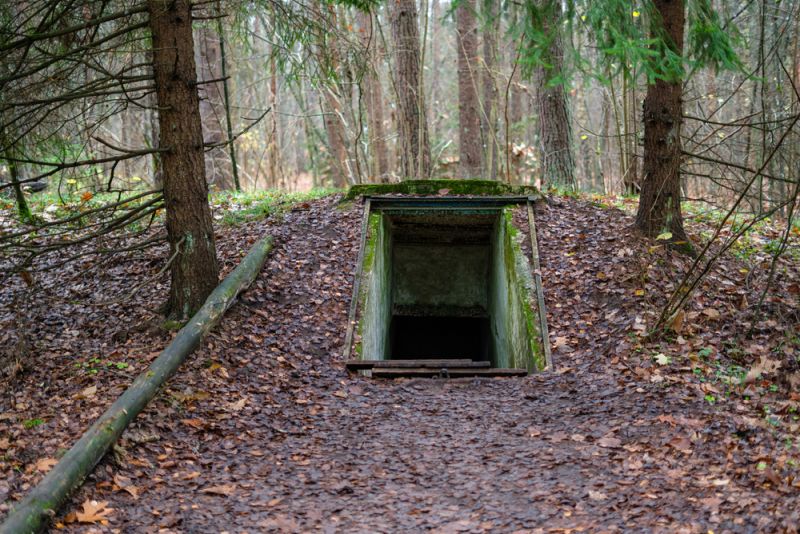
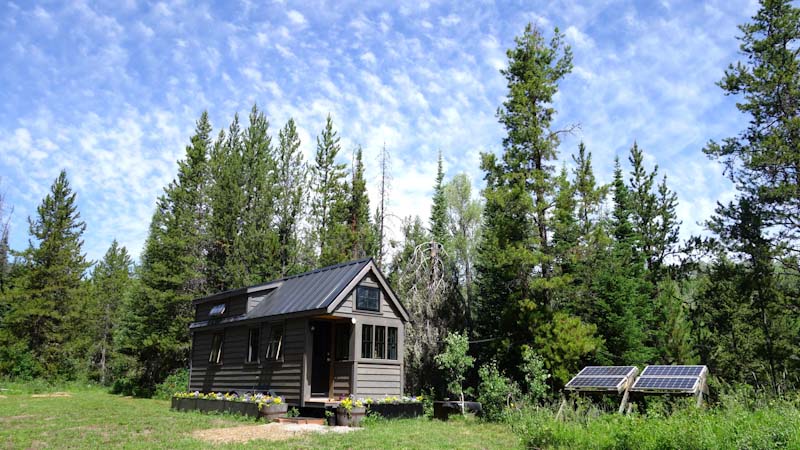
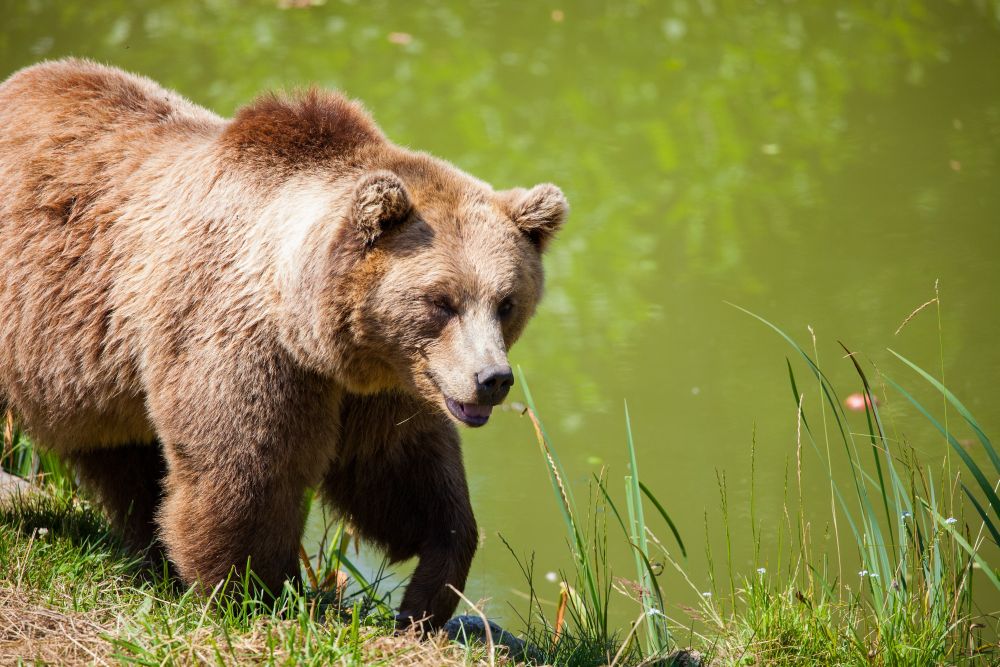


Linda | November 25, 2013
|
….”Fortunately, training him isn’t a hard job “……
LOL
Seriously?
For an experienced horse person, yah, maybe.
I grew up on a pony farm and there is much to consider.
Make sure you get a mature, healthy, even dispositioned horse and take someone who is an expert, not someone with opinions! Know your breeds, stay away from hot tempered horses.
I’d also suggest not too much light colour on the hooves, at least 3/4 dark on the hoof, as that may cause more problems and be very aware of foot care/problems for horses!
Good Luck!
Don russell | July 16, 2014
|
if shtf, horses will be eaten. There’s 300 million guns out there and almost nobody is properly prepped. Horses are big, noisy targets, hitting one from 1/4 mile with a scoped rifle is no feat at all. Then he’s worthless for riding or packing anything, and he’ll soon die. even a .22 rifle can cause a horse’s death, from 100 yds away, with a lung or liver hit. It might take a day for him to actually expire, but he’ll be no good to you in the meantime. Dog packs will run horses into fences, etc. I’ll take a mountainbike, any day. I can just pick it up and set it over a fence, I can chain it to a tree, hidden under a bush, and it will lay there quietly until I return, it won’t get sick or hurt, it won’t bit, kick, throw me, or try to rub me off vs a tree. It won’t make noise, it won’t get up and attract attention, it needs no water or food. It won’t walk away on its own, and it doesn’t cost $5000 to buy, nor $5000 per year to keep, like a horse (that’s worth a hoot) does.
Marty | July 16, 2014
|
I don’t know where you get your info, but it costs no where near $5000 to maintain a horse for a year. Heck, I have four and it doesn’t cost me that much including the yearly vet call. I buy 600 small bales of hay, half grass and half alfalfa. This year that came to $3,800. Both my growers agree to take silver in pay when the economy tanks. I will agree that I do have concerns about someone shooting them, although I guess I could keep them locked up in the barn.
John | November 25, 2013
|
I..gather you’ve never read “Old Yeller”??
Seriously, for all that I understand the point you make in this posting, I must comment that..most people..barely have the money to fund a bug-out vehicle, never mind a horse. If you happen to live on a farm or acreage and prefer having horses to other means, OK, fine, but I can’t recommend a horse for only a concern about societal meltdown.
Horses cost a great deal to purchase, house, and feed.
I’d think you’d be better of with a skilled dog.
AT | November 26, 2013
|
How about a llama?
Greg Hall | March 29, 2014
|
I’ve raised Llamas for more than 20 years. They are extremely smart, typically learn new ‘tasks’ faster than my dogs, eat less than a horse, and are less intimidating than a horse. You can’t ride them, but they will pack 15-20% of their body weight (up to 1/3 if in good condition) and things that spook a horse (flapping flags, loud noises, etc.) don’t bother them. Possibly since they were breed for 6,000 years as pack animals. Finally, they ‘fold up’ and can be transported in the back of a mini-van. Something to think about 🙂
HUTCH | November 26, 2013
|
This is the least useful of the series. As a former horse owner, in a SHTF situation, a horse would be the 1st logistic burden I would eliminate. The whole idea of hauling a horse around for increased mobility, challenges the immagination.
jerry | November 26, 2013
|
What? As a horseman with some 20 years of experience…. If I knew some pain in the ass that I wanted to get rid of, a novice with horses, I would send him/her into the ring with a training manual. I would return in a few hours with my shovel to bury him/her.
Horses are wonderful. They are also VERY strong, fast, hear better than you do, smell more things than you do and, consequently, are living in a different environment while you are standing just a few feet away. Training safely requires people who have experience, common sense along with good horse sense.
jw | November 26, 2013
|
Horses will be needed in a long term grid down situation. But only knowledgeable horse people with the acreage and experience should be keeping horses in such a situation. Even then, only the easy keeping, well trained, hardy and sturdy footed horses will make it. Learning to ride is one thing, but training and keeping horses us another.
Old Soldier | November 27, 2013
|
Horses are high maintenance animals. If you want an animal larger than a dog, get a burro. They can live on almost any forage, horses cannot. They can pack more than a horse on poor forage and if you don’t live on a farm. Upkeep and vet bills, etc will not eat you alive as a horse will and does.
admin | November 27, 2013
|
You have all made some valid points here. We may have been a bit myopic when writing this piece – the article was written based upon the premise that it was being read by a moderately experienced horse owner looking for a list of basic skills that the horse would need should the horse owner decide to use him as a vehicle or as a pack animal in a SHTF situation.
That being said, Linda makes the point that there is much that goes into choosing and training a horse for this purpose and we agree. You need a sane, quiet, healthy animal with good feet and if you aren’t an experienced horse person, seek the assistance of a professional trainer.
John and Hutch, it’s a matter of preference. There are some SHTF scenarios where we would personally prefer a horse over a vehicle and others where we would take the bug-out vehicle without thinking twice. We never meant to imply that a horse should replace a vehicle; the goal was to provide a list of skills necessary SHOULD a person choose to use a horse.
Jerry, well said. Again, the article was written as a general guide to other experienced horse owners and we probably should have added the disclaimer for novices to seek the assistance of a qualified trainer. We truly meant the piece to be more of a list of necessary skills with a couple of general tips thrown in than a training guide. Thanks for adding the disclaimer for us!
Marty | February 10, 2014
|
Good article. To me it was obvious this was written for current horse owners. I plan on using my horses when SHTF time comes. You can’t believe how much closer you can get to game animals while horseback. Something else you need to do is get them use to the smell of blood. As a prey animal, they have a very strong fear of it.
Yes they are expensive, but I buy my hay a year at a time. I have made a deal with my growers for them to accept silver after the dollar crashes. My grass hay farmer is even looking into non mechanical farming like the Amish do in case fuel is no longer available.
If you don’t have horses prior to SHTF, it’s not a good idea to get one after. It will probably be too late. Just my 5 cents worth.
Mith Radates | November 27, 2013
|
The article was valuable in that it convinced me that I would never try to use a horse for transport after TEOTWAWKI. After the fuel runs out for the car, motorcycles and scooters, if I have to travel, I’m better off with a mountain bike.
Jp | November 27, 2013
|
Feeding a horse in the winter would be nigh impossible in most of the 48 states… On average it takes @ least 3-4 ton of hay (depending upon the length and sevarity of ur winters) to keep a horse healthy and strong…So Who will b making the hay??? How would u get all that hay to ur place of refugue? It cannot be stored for long (meaning years), not only will it loose nutritional value, bit there could also be dust, mold and other animals competing/ living in ur hay stack…I suggest, as others have before me, smaller animals, llama’s, donkey’s, larger breeds of dogs, and goats… All these critters can b trained to carry supplies, and tend to be more hardy then many of today’s horse breeds… Dont get me wrong, I Love horses and have trained them for years, but the simple logistics of horse upkeep would be more of a burden for the average person… @ least for the first few years.
Great Grey | December 6, 2013
|
If you don’t want a horse, try an ox. They can do almost everything a horse can and are more durable. Oxen were used on the Oregon trail more than horses were.
unknown | February 4, 2014
|
….wow yal are very negative…I think it’s a good post. Obviously they arnt talking to the inexperienced persons out there….and like anything and everything out there you need experience to really excel with anything, rather it be car, bike, animal etc…..it’s not impossible having a horse in that type of situation, horses can adapt very quickly & easily. And they can also get where cars, bikes and even walking would be Impossible or extremely difficult….there forage animals and will find food, knowledge is key. They didn’t state it was for everyone, but for those interested…..not to besmerch any of you, you have good points….I mean what are you going to do if your bike gets a flat? The chains will Obviously rust and deteriorate being exposed to the elements 24/7…same with cars…..I mean absolutely everything has its drawbacks you must seriously consider before passing judgement on things.
jim l | February 10, 2014
|
I have a couple of horses and although at this time I have not trained them to pull a cart or logs I have plans to do just that. I live in Amish country in Western NY and I can tell you that the horse well trained will cut the hay bail the hay and tote it back to the barn for you, along with your fire wood and till your fields even when they are so wet you wouldn’t want to take a tractor into them. I watch this every year. Now I use a tractor to cut and bail my hay but I have plans on getting a mower that is run by the simple pulling from the horse. I agree that horses aren’t for everyone and if I do have to bug out I plan to take them with me. I have found that with my bow I can be on my horse and literally walk almost right up to a dear before they will even think about moving. Yep they just look at me wondering what is this strange animal that smells like a horse and then they stand there and let me take them down. they do hear better and smell better and will notify you of any problem long before you would have noticed. Anyway if you already have horses like I do it only makes sense to train them to pay for their keep and they will gladly!
Brandi | April 30, 2014
|
Well said! And they will protect you! I’ve had my Arab run off a 300 lb bear who ” happened” to cross my path and not be too friendly! She didn’t hesitate to listen and protect both of us even though she is a prey animal. If it were just me -I’d be in a hospital bed. Good luck doing that with a bike. A well trained horse with a well trained owner is IMHO a very valuable asset!!!
Jeff | February 11, 2014
|
Training my horse to ly down and be still , plus be quiet took me along, long time. Which
is unusual. Buck can master most task quickly. Buck is the ultimate survival horse now.
Wish I could afford two more . Maybe I can barter my skills for enough cash or a good
horse. Thanks for your data, very helpful to us. Good riding and be safe.
Jeff ( horse lover)
Steve | March 29, 2014
|
And if worse does ever come to worst, you can eat a horse.
Marty | March 29, 2014
|
Right on point! Although I hate to even think of eating any one of my horses. For me, that’s exactly why I have an ample supply of food storage. But, as a last resort, Who knows, but I would have a huge fight on my hands with my wife and daughter. Marty
Robert Ferguson | March 29, 2014
|
What is going on?
Hermen | April 22, 2014
|
Let’s think back a hundred years. How was the West won? How did Alexander the Great conquer Asia? What about the Huns? Genghis Khan? How did the plains Indians fight their wars? If the SHTF we would really just be turning the clock back after using up our fossil fuel stores. Think of the pictures of horses and donkeys pulling wagons made of old cars in third world countries.
A vehicle that runs on grass and water! Unlike motor vehicles that break down and run out of parts these self reproduce! And you can eat it if you have to. I think this is a major piece of the puzzle that is missing from most prepper sites! Thanks guys!
Pingback:Top 10 Vehicles For Your EMP Survival | Survival skills, survival guns, survival guide | February 24, 2015
|
Pingback:Top 10 Vehicles For Your EMP Survival | From the Trenches World Report | March 3, 2015
|
Pingback:5 Animals To Raise For Survival Transportation | July 20, 2015
|
Pingback:Train Your Horse for a SHTF Scenario - Survival News and Views | January 10, 2016
|
Pingback:15 Lost Survival Tips From The Cowboys Who Wandered The West – With Illustrations | Ask a Prepper | January 12, 2016
|
Pingback:15 Lost Survival Tips From The Cowboys - Backdoor Prepper | January 12, 2016
|
Pingback:15 Lost Survival Tips From The Cowboys - Bio Prepper | January 24, 2016
|
Pingback:5 Animals To Raise For Survival Transportation | Survivopedia | July 27, 2017
|
Alisha Ross | February 17, 2020
|
“Thank you for any other informative site. Where else could I am getting that kind of
info written in such a perfect approach? I’ve a undertaking that I’m just
now running on, and I have been on the glance out for such
information.”
Alisha Ross | October 14, 2020
|
Might be almost not possible to encounter well-educated individual on this issue, then again you appear like you know those things you’re raving about! Thanks A Lot